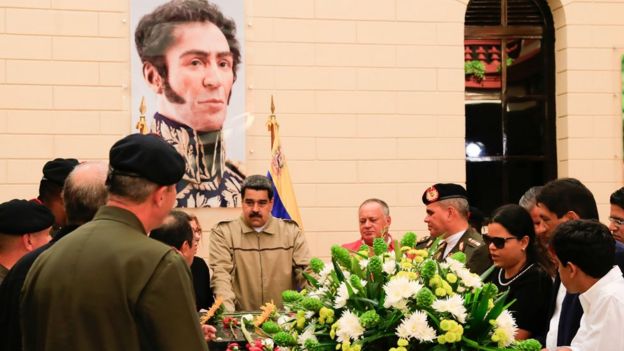Venezuela crisis: Maduro vows to defeat ‘crazed minority’
Venezuela’s President Nicolás Maduro has vowed to defeat a “crazed minority” that wants to remove him from power.
In a challenge to opposition leader Juan Guaidó, he called for “anti-imperialist marches” on Saturday to coincide with anti-government protests.
Mr Maduro’s comments were the first since Mr Guaidó defied him and returned to the country on Monday.
Separately, the US said it was considering imposing new sanctions to pressure Mr Maduro to give up power.
The US envoy for Venezuela, Elliott Abrams, said it was hard to see a role for Mr Maduro in future democratic elections.
“If he wanted to build a democratic Venezuela, he had the opportunity to do so, but he did not,” Mr Abrams said.
As head of the opposition-led National Assembly, Mr Guaidó proclaimed himself Venezuela’s interim president in January after the legislature declared Mr Maduro’s re-election last year illegitimate.
How did Mr Maduro address the Guaidó challenge?
He has accused the opposition of trying to organise a coup with US help.
Speaking at an event marking the sixth anniversary of the death of his predecessor and political mentor, Hugo Chávez, Mr Maduro said: “While a crazed minority continues with their hatred, with their bitterness, it’s their problem. We won’t pay attention to them, compatriots.”
In front of gathered military personnel, he added: “We’re going to stop them in their tracks, their work, the national union.
“Let the crazy minority continue with their bitterness, we’ll defeat them. For Chávez we’ll do it, for the great history of the country we’ll do it.”

Why is there pressure for change?
Venezuela’s political crisis has been sparked by an economic meltdown in which hyperinflation has hit salaries and savings, leading many to flee the country.
The country is also suffering chronic shortages of basic items including food and medicine.
While international pressure on the president has steadily increased – more than 50 countries, including the US and most Latin American nations, have recognised Mr Guaidó as interim leader – Mr Maduro has dismissed all calls for him to step down.
Backed by China and Russia, Mr Maduro insists he is the only legitimate president.
His call for marches on Saturday sets the stage for more confrontation with Mr Guaidó, the BBC’s Will Grant in Caracas reports.
Given the potential for clashes, the authorities will, no doubt, try to keep the two sides well apart, our correspondent adds.
On Monday, Mr Guaidó arrived back in the capital, Caracas, despite the threat of arrest after he defied a Supreme Court-imposed travel ban on leaving the country. He visited several Latin American countries to lobby for international help.
In talks with public sector unions on Tuesday, he has vowed to stage strikes to help bring down the government.
“They thought the pressure had already maxed out… They better know that the pressure has barely begun.”
‘Gold talks’
In a separate development, Mr Guaidó asked America’s Citibank to delay by 120 days Venezuela’s scheduled repurchase of gold that Mr Maduro’s government put up as collateral for a loan in 2015, Reuters reports.
It says Mr Guaidó’s advisers have met Citibank officials to ask them to hold off claiming the gold that Mr Maduro’s government committed to give up if it failed to pay off the loan in March.
Citibank has not commented on the issue.
The reported request is seen as Mr Guaidó’s strategy to protect Venezuela’s foreign assets and prevent the Maduro government from selling off gold reserves to raise much needed hard currency.
The government appears to be feeling the sanctions imposed by the US.
Reuters reported last week that the government had taken eight tonnes of gold from Venezuela’s central bank to sell abroad to raise cash.
Source: BBC



